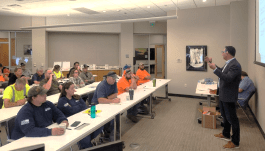AWWA, RCAP empower small water systems with decade-long EPA grant program
July 10, 2024

AWWA Articles
AWWA, RCAP empower small water systems with decade-long EPA grant program
The American Water Works Association (AWWA) and the Rural Community Assistance Partnership (RCAP) recently concluded a decade-long program that provided training to more than 10,400 professionals at small water systems across the nation.
Through a grant from the U.S. Environmental Protection Agency (EPA), AWWA and RCAP conducted a series of workshops from May 2014 to March 2024 focused on compliance with the Safe Drinking Water Act (SDWA).
 The initiative, titled Training and Technical Assistance for Small Public Water Systems to Achieve and Maintain Compliance, addressed the unique challenges faced by small systems that often have limited resources and staff. The grant funded more than 450 free workshops to equip small systems with the knowledge and tools needed to deliver safe and reliable drinking water to their communities. (Pictured right, RCAP training in Illinois.)
The initiative, titled Training and Technical Assistance for Small Public Water Systems to Achieve and Maintain Compliance, addressed the unique challenges faced by small systems that often have limited resources and staff. The grant funded more than 450 free workshops to equip small systems with the knowledge and tools needed to deliver safe and reliable drinking water to their communities. (Pictured right, RCAP training in Illinois.)
“The workshops provided current training content which was specifically for small systems to assist them in maintaining compliance with the Safe Drinking Water Act,” said Kay Sanborn, executive director of the AWWA Kentucky-Tennessee Section.
By tailoring training content specifically to small systems, AWWA and RCAP ensured that participants received relevant and actionable information on maintaining SDWA compliance. Workshops covered a wide range of topics, with the most popular being distribution system infrastructure and water quality, disinfection/DBPs and regulatory overview.
“Most of our regular training content is geared toward medium to large public water systems,” Sanborn said. “The SDWA workshops benefited small systems only and offered an atmosphere where the participants were among their peers. This allowed for the exchange of information between the systems that they can continue to use.”
Partnership, adaptability drive success
The success of the partnership was evident in the workshops’ attendance, active participation and engagement with relevant training content. Even during the COVID-19 pandemic, AWWA and RCAP worked collectively to update workshop content to maintain program continuity and ensure effective delivery in a virtual setting.
 A strong partnership between AWWA and its local sections was also key to the program’s success. AWWA developed high-quality training content, which was then delivered through local sections in collaboration with RCAP Partners.
A strong partnership between AWWA and its local sections was also key to the program’s success. AWWA developed high-quality training content, which was then delivered through local sections in collaboration with RCAP Partners.
“Our RCAP partners were able to select the training modules which were most relevant to small systems in Kentucky and Tennessee since they work with them on a daily basis, unlike us,” said Sanborn. “I feel like the participants were able to relate it to their own systems when they returned.”
Participants also received a copy of the AWWA Small Systems Field Guide, providing a convenient and relevant reference for the day-to-day information needed to operate small water and wastewater systems.
“The AWWA Field Guide was provided to the participants, and all seemed glad to receive it, so that is a useful tool that has long-term benefits,” said Sanborn.
This effort also resulted in the development of more than 10 AWWA eLearning courses, available free of charge to small systems, allowing staff to continue learning according to their own pace and schedule.
While the current series of workshops has concluded, AWWA maintains its commitment to small water systems, supported by the 2030 AWWA Strategic Plan and its commitment to providing inclusive and accessible opportunities for members, sections and water professionals. AWWA and RCAP have recently renewed their Cooperative Agreement, pledging to continue their joint efforts to improve water infrastructure and services for small and rural communities.
For additional small systems resources, including membership information, visit AWWA’s Small Systems website page.
Advertisement